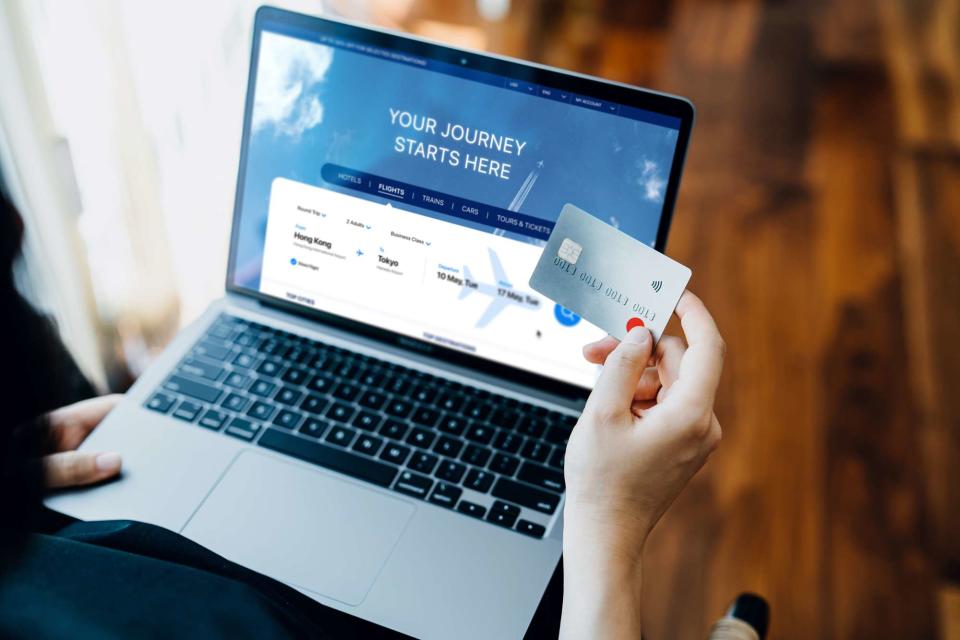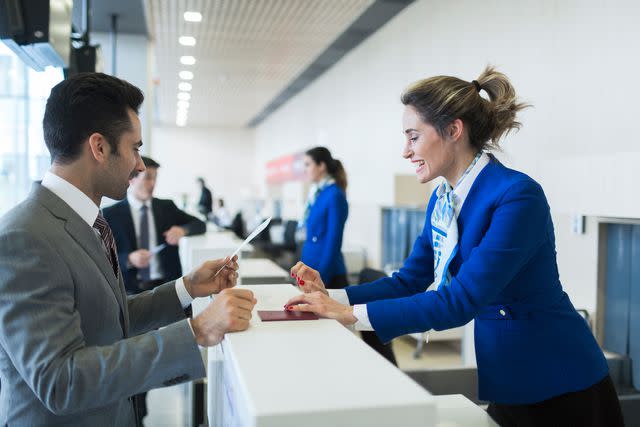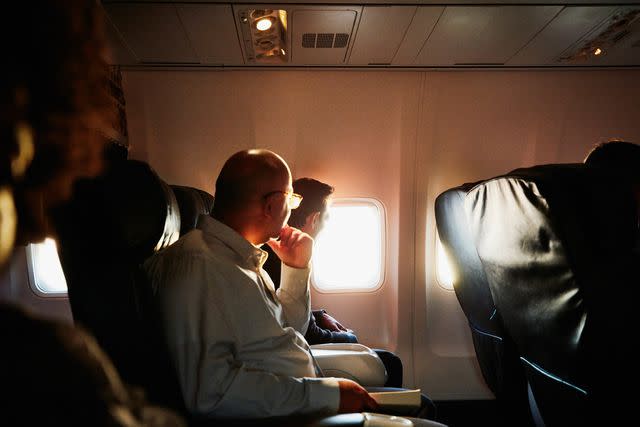Why Are Flights So Expensive Right Now? We Asked the Experts
Here's what you should know about airfare pricing.

d3sign/Getty Images
If you’re preparing for summer travel, you’re likely experiencing some sticker shock when searching for airfare. Even though the Department of Transportation just announced new rules to curb airline "junk fees," there's still some mystery around what exactly goes into ticket pricing. We spoke with Ryan Ewing, founder of AirlineGeeks, Anton Radchenko, CEO of AirAdvisor, and Mercedes Zach, travel agent at ASAP Tickets, to learn more about the factors that make flights expensive.
Ultimately, there isn’t a cut-and-dry answer. “Departments have hundreds of people that do pricing, and it's a very complex process,” explains Ewing. “Like anything in the world, inflationary factors are creating a situation where pricing is a bit higher, and airlines are no stranger to that.”
Here’s what our experts have to say about why flights are so expensive — and how to save money on your next adventure.
Ryan Ewing is the founder of AirlineGeeks, an aviation news site.
Anton Radchenko is the CEO of AirAdvisor, a company that helps passengers claim compensation for air travel delays, cancellations, and more.
Mercedes Zach is a travel agent at ASAP Tickets, a travel booking site.

Tempura/Getty Images
Airline Taxes and Fees
If you look closely when you’re buying airfare online, you might notice that the base fare is pretty affordable, but in some cases, the added taxes and fees almost double the cost. Two types of fees are added to your ticket — government-imposed taxes and fees and carrier-imposed fees. Government taxes include things like a $5.60 Passenger Fee or a September 11 Security Fee to help fund additional security, an air transportation tax, a federal segment fee, and a facility charge. The exact amounts will vary based on your airport, whether you have a layover, and whether you’re flying a domestic or international route.
“Certain countries have pretty substantial tourism taxes, so those will definitely hide in your ticket,” says Ewing. “If you ever want to take [a look] after you purchase a ticket, look at the raw ticket, and you'll see a ton of taxes being tacked on at the end.”
These taxes will vary substantially between domestic and international routes. Let’s look at a couple examples to understand how this works. A one-way, nonstop flight from New York City (JFK) to San Francisco (SFO) on Delta Air Lines in the main cabin costs $378.10. Here’s the breakdown:
Base fare: $337.67
U.S. Transportation Tax: $25.33
U.S. Passenger Facility Charge: $4.50
U.S. Flight Segment Tax Domestic: $5.00
U.S. Passenger Civil Aviation Security Service Fee: $5.60
So, you’re paying $40.43 in taxes and fees on a $337.67 ticket, or roughly 12 percent.
Let’s compare this to an international journey. A round-trip flight from JFK to London (LHR) on Delta Air Lines in the main cabin costs $825.60. Here’s the breakdown:
Base fare: $338.00
Carrier-imposed international surcharge: $245.00
U.S. Passenger Civil Aviation Security Service Fee: $5.60
U.S. International Departure Tax: $44.40
U.S. Passenger Facility Charge: $4.50
U.S. APHIS Passenger Fee: $3.83
U.K. Passenger Service Charge Departures: $60.80
U.S. Customs User Fee: $6.97
U.S. Immigration User Fee: $7.00
U.K. Air Passenger Duty: $109.50
So, on a base fare of $338.00, you’re paying $487.60 in taxes and fees, which more than doubles your ticket's cost. To cut down on taxes and fees, you can change your departure and arrival airports or the country you’re transiting through.
Related: How to Book a Flight to Get the Best Deals

Thomas Barwick/Getty Images
Factors Affecting Flight Prices
Carrier-imposed fees are the other things getting tacked onto your ticket. These are typically added to cover fuel, and you will notice them more frequently when redeeming your miles for a flight.
“The International Air Transport Association, the body that represents the majority of key airlines, which contribute to around 80 percent of air traffic, is estimating the cost of jet fuel to rise to $2.70 per gallon, up from an average of around $2.66 per gallon in 2023,” explains Radchenko. “On March 12th, in an SEC filing, American Airlines reported that it expects to pay an average of between $2.80 and $2.90 per gallon of fuel, a stark increase in comparison to its previously predicted average of between $2.65 to $2.85.”
Ultimately, airlines aren’t going to take a cut in profits because fuel costs more than it did in previous years. These cost increases will be passed onto consumers, whether through an increased fare price or a fuel surcharge on mileage redemptions.
Another factor that impacts your flight price is the availability of seats. “According to an OAG report in December, global seat capacity for 2023 was just 3.7 percent behind 2019, and already in the first quarter of 2024, OAG expects it to be 2.9 percent ahead, meaning that the airfare price should be more stable and easier to predict from now on,” says Zach. Hopefully, this is good news for travelers and will mean flight prices will level or even decrease in the coming months.
However, it’s still unclear how the ongoing issues with Boeing will impact seat availability. If you haven’t heard, there have been significant safety and performance issues with the Boeing 737 Max. These issues could have a tremendous impact on the industry in the coming years. “I always say it's a pretty bad day when the consumers start to realize what aircraft types they are flying on,” says Ewing. A growing number of travelers are avoiding those planes altogether, using available search engines to filter out Boeing aircraft when booking a flight.
“I think the other problem is that both United and Southwest have cut their planned aircraft delivery in 2024 in half, roughly,” says Ewing. “That's substantial because, from an airline planning perspective, they're planning their capacity growth with those additional airplanes from Boeing in their fleet. And now that that's been cut by roughly 50 percent, there are fewer seats in the marketplace than what they were originally planning.”
Then, it comes down to the basic supply and demand concept — fewer seats in the air means less supply for summer travel while demand is high, leading to increased flight costs.
“Another reason behind increased airfare prices in the previous years was the staff shortage across the travel industry, from pilots to flight attendants and maintenance technicians,” explains Zach. “Not only the airlines but also airport service providers made massive layoffs during the pandemic and have not been able to go back to the previous capacity yet.”
If labor is more expensive and not at full capacity, you could have fewer flights and higher costs. “The International Civil Aviation Organization (ICAO) estimated that by 2026, the aviation industry would require 480,000 new technicians to maintain aircraft and over 350,000 pilots, and that can take up to a decade to fully resolve,” explains Zach.
How to Save Money on Flights
The best way to save money on flights is to be flexible. As someone who travels full-time, I can attest that changing your travel dates by a day or flying to a nearby airport can save you hundreds of dollars, if not more, on your fare. Visiting a popular destination in the off-season or an under-the-radar destination can cut down on airfare and lodging costs.
Ewing recommends doing your research before making a purchase. “Nowadays, Google Flights is probably one of my favorites where you can really scale it down based on several filtering factors, so I use that for sure.” A flight search engine like Google Flights is also a great way to figure out where you want to go on vacation if you haven’t already decided. Select the “anywhere” feature to compare flight costs from your desired departure airport, and you can get a great deal on a ticket.
Related: The Best Time to Book a Flight for Domestic, International, and Summer Travel
“I think there's a stigma around airlines like Spirit and ultra-low-cost carriers, but nowadays they're certainly offering a better premium product than they were,” says Ewing. “Frontier just announced that they offer a blocked middle seat where you pay more for a so-called big front seat, which is basically a first-class seat.” Frontier has labeled this offering UpFront Plus, which is now available in the first two rows of its Airbus planes and will offer much more space. Flying these low-cost carriers can allow you to design your own experience while paying less than you would for a similar seat on a different airline.
You can sometimes avoid paying some of the government-imposed taxes when redeeming miles for your flight. For instance, the JFK to SFO flight we looked at earlier would cost 20,500 Delta SkyMiles, plus just $5.60 to cover the September 11 tax. This cuts out the other $34.83 in taxes. However, depending on the route, you might notice a fuel surcharge getting tacked onto your redemption.
Flights are expensive, but you can get good deals when you look for them. When you find a great deal, purchase it immediately because there’s no guarantee it’ll still be there tomorrow.
For more Travel & Leisure news, make sure to sign up for our newsletter!
Read the original article on Travel & Leisure.


